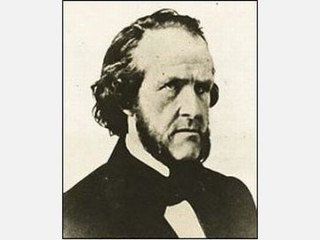
Albert Brisbane biography
Date of birth : 1809-08-22
Date of death : 1890-05-01
Birthplace : Batavia, New york
Nationality : American
Category : Famous Figures
Last modified : 2010-11-12
Credited as : Social terorist, leading advocate of Fourierism,
The American social theorist Albert Brisbane was the leading advocate of the kind of socialism known in the United States as Fourierism.
Albert Brisbane was born on Aug. 22, 1809, in Batavia, N.Y. His father was an influential landowner and his mother a talented and cultivated woman. At the age of 18, already concerned with the progress of man and society, he decided to pursue his studies with the great social thinkers in Europe and left for Paris.
In France, Brisbane studied under such distinguished philosophers as Victor Cousin and Francois Guizot but could not seem to find what he sought. He moved to Berlin, took instruction from G. W. F. Hegel, the grandest theorist of all, and enjoyed the city's progressive intellectual circles. Still unsatisfied, he traveled through eastern Europe and the Turkish Empire.
On returning to Paris, Brisbane's interest in ending human degradation was greatly intensified. He read a treatise by Charles Fourier and wrote that after finishing it he "commenced pacing the floor in a tumult of emotion … carried away into a world of new conceptions." He then studied under Fourier himself for 2 years. In 1834 Brisbane returned to the United States as a disciple of the French socialists.
What had excited Brisbane were Fourier's ideas about the organization of labor. Brisbane simplified the theories, avoided the bizarre aspects, and emphasized the practical, seizing on the idea of "attractive industry." In an ideal society, types of work would be assigned according to individuals' interests instead of by the cruel accidents of the marketplace and class structure. All work would be respected and paid for according to its usefulness, with the most disagreeable being the most highly paid. The reward for labor would be the gratification an individual found in doing it rather than in differences of prestige. This could be brought about only in new associations of men and women, called phalanxes.
In 1839 Brisbane began lecturing. His Social Destiny of Man (1840) and Association (1843) explained Fourier's new system of labor. Horace Greeley, an immediate and influential convert, helped Brisbane establish a newspaper, the Future, and when it failed gave him a column in his own New York Tribune that gained a national audience for Fourierism.
The 1840s were filled with rampant enthusiasm for utopian communities. Quickly, over 40 ventures calling themselves phalanxes were launched. Other communities, like George Ripley's Brook Farm, were converted to Fourierism. Brisbane, however, took no responsibility for them, for they met none of the requirements of careful preparation and financing. Most failed swiftly, and enthusiam for the ideas disappeared.
Though Brisbane could say truthfully that there had been no real trial of Fourierism, the times had moved on. He retired from his propagandizing; only in 1876, in a General Introduction to Social Sciences, did he try again to explain Fourierism to Americans.
Brisbane was married twice and had three children. He died on May 1, 1890, in Richmond, Va.
Brisbane's own Albert Brisbane (1893) is an autobiography to which a character study by his second wife, Redelia, has been added. For background on American socialism see chapters in Morris Hillquit, History of Socialism in the United States (1903; 5th rev. ed. 1910; repr. 1965), and Alice Felt Tyler, Freedom's Ferment: Phases of American Social History from the Colonial Period to the Outbreak of the Civil War (1944). A wide-ranging set of essays and an extensive bibliography is in Donald Drew Egbert and Stow Persons, eds., Socialism and American Life (2 vols., 1952).
















